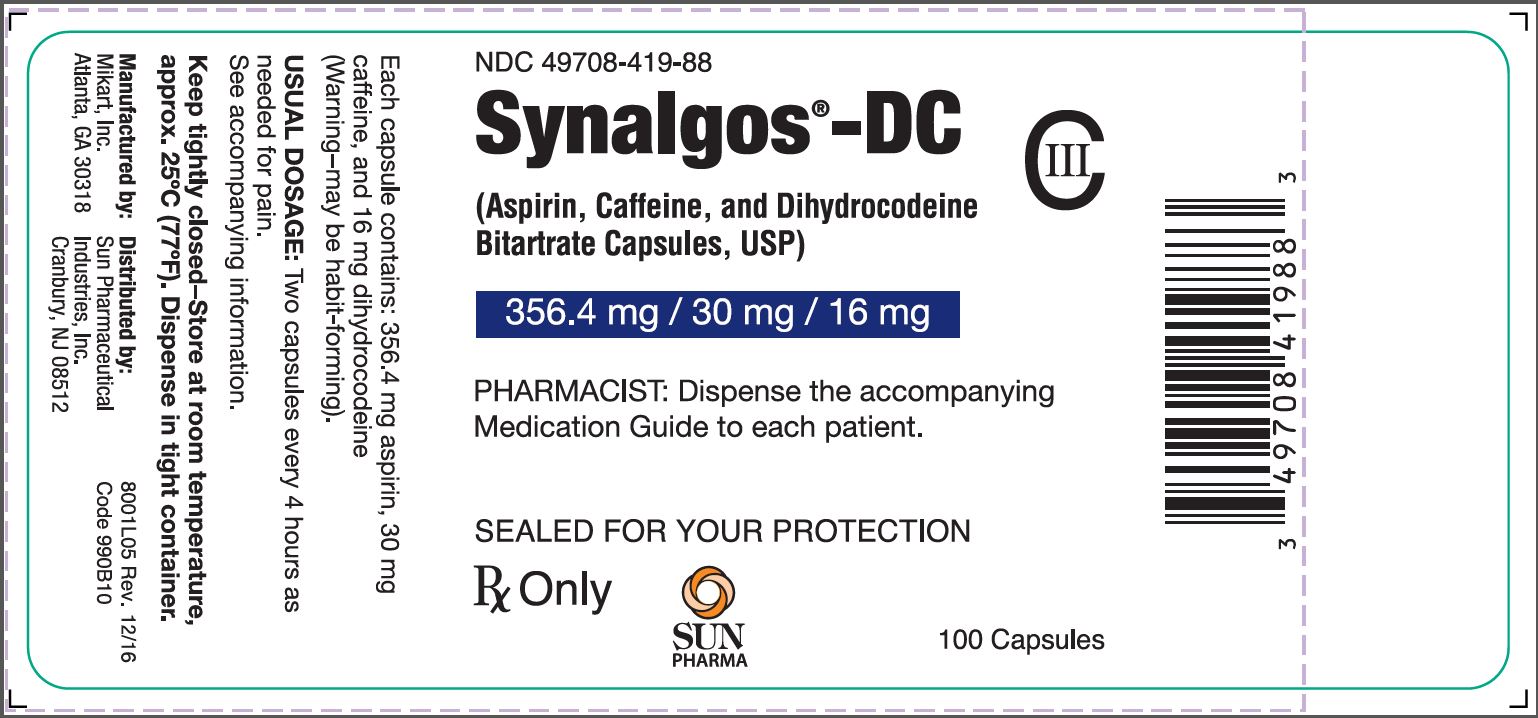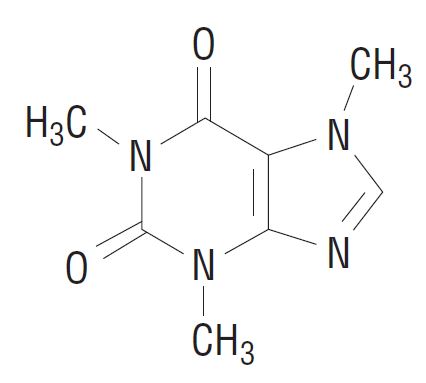
Synalgos | Aspirin, Caffeine, And Dihydrocodeine Bitartrate Capsules Capsule while Breastfeeding
What is Synalgos | Aspirin, Caffeine, And Dihydrocodeine Bitartrate Capsules Capsule ?
Is using Synalgos | Aspirin, Caffeine, And Dihydrocodeine Bitartrate Capsules Capsule safe or dangerous while breastfeeding?

Synalgos | Aspirin, Caffeine, And Dihydrocodeine Bitartrate Capsules Capsule Breastfeeding Analsys
Aspirin while Breastfeeding
Low RiskCAS Number: 50-78-2
Excreted in non-significant amount into breast milk. Reye’s Syndrome has never been reported due to ASA through breast milk. It is thought to be highly unlikely to occur after isolated or small doses like those used for treatment of thrombosis or anti-abortion therapy. At high maternal dose, one case (dubious) of salicylic intoxication in the neonatal period and another case of thrombocytopenia in an infant have been reported. Likelihood of hemolysis should be considered in those patients with G6PD-deficiency. WHO Model List of Essential Medication: compatible while breastfeeding when used occasionally or small dose for antithrombotic prophylaxis management.
Caffeine while Breastfeeding
Low RiskCAS Number: 58-08-2

Trimethylxanthine component which is present in many compounds like decongestant or pain relief drugs (50 to 100 mg per unit) . It is also present in many infusion beverages (coffee, tea, mate, guarana) and other drinks with allegedly energizing properties. See also Coffee, Caffeine (beverages). At a dose higher than 300 mg a-day may induce nervousness and irritability in the infant. Intravenous high doses used to treat post-epidural anesthesia headache within 2-3 days after delivery, before mature breast milk comes, are compatible with breastfeeding. High doses used Intravenously to treat headache related to epidural should be regarded as compatible with breastfeeding only in the 2-3 days before milk comes in. Elimination period may last from few hours in adults, to 3-4 days in the newborn infant. American Academy of Pediatrics: Maternal Medication Usually Compatible With Breastfeeding.
Dihydrocodeine bitartrate while Breastfeeding
Low RiskCAS Number: 125-28-0
Used for pain and cough relief. As analgesic it is not more effective than Ibuprofen. The enzyme cytochrome P450-CYP2D6 catalyzes its metabolization into dehydromorphine. On date of latest update relevant data concerning breastfeeding were not found. Product with similar characteristics than Codeine but with lower oral bioavailability which would be advantageous for breastfed infants. Codeine is excreted into breast milk in non-significant amount, however, serious health problems have appeared among off-spring of mothers who are rapid metabolizers from Codeine to Morphine. Discontinue if excessive sedation appears in mother or infant, and, do not administer if such a background in mother or family is present, as there are between 1% and 29% of people who are rapid metabolizers from codeine to morphine with an excess of the gene linked to enzyme P450-CYP2D6.
Synalgos | Aspirin, Caffeine, And Dihydrocodeine Bitartrate Capsules Capsule Breastfeeding Analsys - 2
Aspirin while Breastfeeding
CAS Number: 50-78-2

After aspirin ingestion, salicylic acid is excreted into breastmilk, with higher doses resulting in disproportionately higher milk levels. Long-term, high-dose maternal aspirin ingestion probably caused metabolic acidosis in one breastfed infant. Reye's syndrome is associated with aspirin administration to infants with viral infections, but the risk of Reye's syndrome from salicylate in breastmilk is unknown. An alternate drug is preferred over continuous high-dose, aspirin therapy. After daily low-dose aspiring (75 to 325 mg daily), no aspirin is excreted into breastmilk and salicylate levels are low. Daily low-dose aspirin therapy may be considered as an antiplatelet drug for use in breastfeeding women.[1][2][3].
Caffeine while Breastfeeding
CAS Number: 58-08-2
Caffeine appears in breastmilk rapidly after maternal ingestion. Insufficient high-quality data are available to make good evidence-based recommendations on safe maternal caffeine consumption.[1] Fussiness, jitteriness and poor sleep patterns have been reported in the infants of mothers with very high caffeine intakes equivalent to about 10 or more cups of coffee daily. Studies in mothers taking 5 cups of coffee daily found no stimulation in breastfed infants 3 weeks of age and older. Some experts feel that a maternal intake limit of 300 mg daily might be a safe level of intake.[2] However, preterm and younger newborn infants metabolize caffeine very slowly and may have serum levels of caffeine and other active caffeine metabolites similar to their mothers' levels,[2][3][4] so a lower intake level preferable in the mothers of these infants. Other sources of caffeine, such as cola and energy drinks, yerba mate or guarana, will have similar dose-related effects on the breastfed infant. Coffee intake of more than 450 mL daily may decrease breastmilk iron concentrations and result in mild iron deficiency anemia in some breastfed infants.[5]
Dihydrocodeine bitartrate while Breastfeeding
CAS Number: 125-28-0

Maternal use of oral narcotics during breastfeeding can cause infant drowsiness, central nervous system (CNS) depression and even death. Like codeine, pharmacogenetics probably plays a role in the extent of CNS depression. Newborn infants seem to be particularly sensitive to the effects of even small dosages of narcotic analgesics. Dihydrocodeine possibly caused severe respiratory depression in one newborn infant whose mother was taking the drug for cough. Once the mother's milk comes in, it is best to provide pain control with a nonnarcotic analgesic and limit maternal intake of hydromorphone to a few days at a low dosage with close infant monitoring. If the baby shows signs of increased sleepiness (more than usual), difficulty breastfeeding, breathing difficulties, or limpness, a physician should be contacted immediately. Because there is little published experience with dihydrocodine during breastfeeding, an alternate drug may be preferred, especially while nursing a newborn or preterm infant.
I already used Synalgos | Aspirin, Caffeine, And Dihydrocodeine Bitartrate Capsules Capsule and meanwhile I breastfed my baby should I be concerned?
Synalgos | Aspirin, Caffeine, And Dihydrocodeine Bitartrate Capsules Capsule is in the category of low risk, if you have already used it then its not a big deal if health and behavior of baby is good. However your health care provider shall be aware of the fact that you have used Synalgos | Aspirin, Caffeine, And Dihydrocodeine Bitartrate Capsules Capsule so you should inform him based on your convenience.
My doctor has prescribed me Synalgos | Aspirin, Caffeine, And Dihydrocodeine Bitartrate Capsules Capsule, what should I do?
Synalgos | Aspirin, Caffeine, And Dihydrocodeine Bitartrate Capsules Capsule comes in category of low risk and if your doctor is aware that you are breastfeeding it should be ok to use
If I am using Synalgos | Aspirin, Caffeine, And Dihydrocodeine Bitartrate Capsules Capsule, will my baby need extra monitoring?
Not much monitoring required while using Synalgos | Aspirin, Caffeine, And Dihydrocodeine Bitartrate Capsules Capsule
Who can I talk to if I have questions about usage of Synalgos | Aspirin, Caffeine, And Dihydrocodeine Bitartrate Capsules Capsule in breastfeeding?
US
National Womens Health and Breastfeeding Helpline: 800-994-9662 (TDD 888-220-5446) 9 a.m. and 6 p.m. ET, Monday through Friday
UK
National Breastfeeding Helpline: 0300-100-0212 9.30am to 9.30pm, daily
Association of Breastfeeding Mothers: 0300-330-5453
La Leche League: 0345-120-2918
The Breastfeeding Network supporter line in Bengali and Sylheti: 0300-456-2421
National Childbirth Trust (NCT): 0300-330-0700
Australia
National Breastfeeding Helpline: 1800-686-268 24 hours a day, 7 days a week
Canada
Telehealth Ontario for breastfeeding: 1-866-797-0000 24 hours a day, 7 days a week
